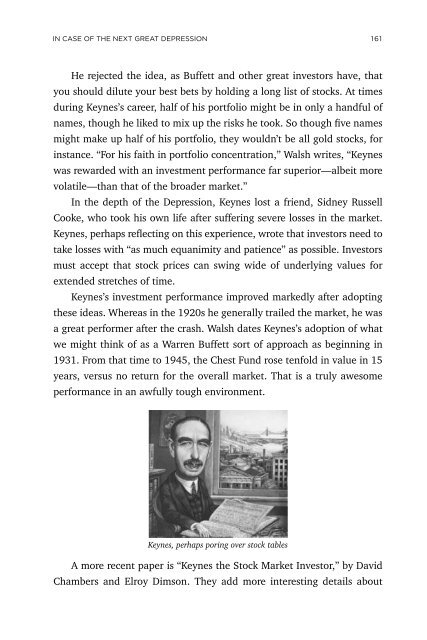Create successful ePaper yourself
Turn your PDF publications into a flip-book with our unique Google optimized e-Paper software.
IN CASE OF THE NEXT GREAT DEPRESSION 161<br />
He rejected the idea, as Buffett and other great investors have, that<br />
you should dilute your best bets by holding a long list of stocks. At times<br />
during Keynes’s career, half of his portfolio might be in only a handful of<br />
names, though he liked to mix up the risks he took. So though five names<br />
might make up half of his portfolio, they wouldn’t be all gold stocks, for<br />
instance. “For his faith in portfolio concentration,” Walsh writes, “Keynes<br />
was rewarded with an investment performance far superior—albeit more<br />
volatile—than that of the broader market.”<br />
In the depth of the Depression, Keynes lost a friend, Sidney Russell<br />
Cooke, who took his own life after suffering severe losses in the market.<br />
Keynes, perhaps reflecting on this experience, wrote that investors need to<br />
take losses with “as much equanimity and patience” as possible. Investors<br />
must accept that stock prices can swing wide of underlying values for<br />
extended stretches of time.<br />
Keynes’s investment performance improved markedly after adopting<br />
these ideas. Whereas in the 1920s he generally trailed the market, he was<br />
a great performer after the crash. Walsh dates Keynes’s adoption of what<br />
we might think of as a Warren Buffett sort of approach as beginning in<br />
1931. From that time to 1945, the Chest Fund rose tenfold in value in 15<br />
years, versus no return for the overall market. That is a truly awesome<br />
performance in an awfully tough environment.<br />
Keynes, perhaps poring over stock tables<br />
A more recent paper is “Keynes the Stock Market Investor,” by David<br />
Chambers and Elroy Dimson. They add more interesting details about


